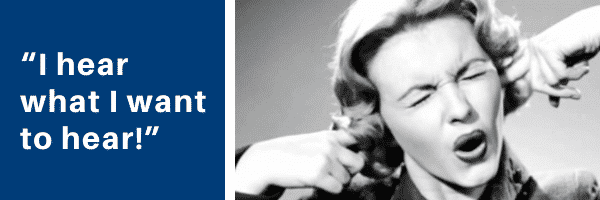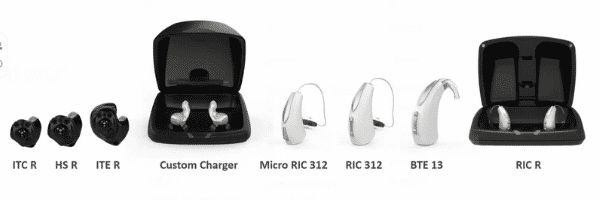Have you or someone you know said these words? If you ever find yourself saying these words, you may be protecting yourself from feeling embarrassed about your hearing.
“You hear what you want to hear.”
You just don’t catch all the words. Other than having slight difficulty in noisy settings or hearing people with really soft voices, you hear ‘well enough’. If people would only stop mumbling, everything would be fine. Right? Wrong!
These symptoms of hearing loss are indicative of a high-frequency hearing loss. High-frequency hearing loss is the most common type of hearing loss. For many of us who have been exposed to high levels of noise or music, high-frequency hearing is the first to deteriorate. You may have normal hearing for low-pitched sounds but have a considerable loss for high-pitched speech sounds such as t, f, s, k, and th. You hear but can’t distinguish certain speech sounds, making it much more difficult to understand high-pitch females, small children, and conversations in background noise.
As your hearing loss slowly progresses
Your eyes and brain compensate for the deficit. In fact, you only need to hear about 25% of speech sounds in order to understand speech. The other 75% of speech sounds can be inaudible, and you can still get the drift of the conversation. With the help of the eyes, the brain pieces together the missing information, trying to make sense of the conversation.
The human brain is an amazing thing
The brain actually consumes enough power to light a 20-watt light bulb, and even more when you are forced to work hard to understand a conversation. Hearing and understanding in noisy environments require extra processing from the brain. When the brain is fed sufficient information, it can separate the speech signal from the noise signal. This gives us automatic noise suppression with little conscious effort. By the way, you need two ears working together in stereo to do this.
A person with a high-frequency hearing loss cannot hear these sounds and therefore, has little or no information to piece together. Their brain simply does not receive enough information to put the conversation together, regardless of how smart or how hard one tries.
People who “hear what they want to hear” are probably using all of their available brainpower to listen. It is not likely that they will be able to exert that much effort for very long. Most people check out of a conversation after approximately ten minutes.
This is also true for people with normal hearing
We all feel resigned about missing parts of a conversation. As humans, we rationalize that sometimes it’s not worth listening or we blame others for mumbling. After straining for a while, you simply give up because it’s exhausting to have to listen so intently.
Believe it or not, a high-frequency hearing loss is the most insidious of all hearing losses. While your hearing gradually deteriorates, so can your relationships and psychological well-being. Untreated hearing loss affects every aspect of one’s life: social, emotional, mental, and even physical.
Most hearing and clarity problems can be helped
Properly fit hearing instruments, made especially for high-frequency hearing loss, make speech sounds more audible, reducing the power drain on your brain. With some brainpower left over, you are more likely to enjoy the conversation. That extra brainpower could be there to enjoy others, not to decipher chopped up speech sounds.
Start with an annual hearing evaluation to find out what you are missing
Also, request a “Speech-In-Noise” test so that you can determine how much your hearing loss is affecting your ability to follow the conversation in the presence of background noise. This test will reveal a lot to you. And it helps us guide you in making the best decisions about your hearing healthcare. Together, we can keep you hearing the best you can for life!
Have you been ADOPTED by Avalon?
For many of you, the answer is YES. So, let’s make sure that you are hearing and understanding the best you can. Your current hearing aids may need a programming adjustment to give you better clarity. Or it may be time to take advantage of the newest hearing aid technology. Find out if you could hear more clearly with the new, smartest hearing technology.
For some of you, the answer is NO. You have not been adopted by Avalon. Please know that it serves no purpose to wait until your hearing gets worse. By the time you perceive that your hearing is bad enough, you may have waited too long for your own good.
If you truthfully DON’T hear what you want to hear, call Avalon now at (916) 235-9771.



